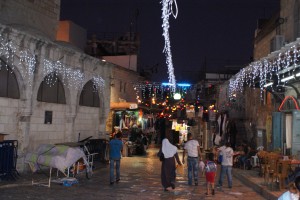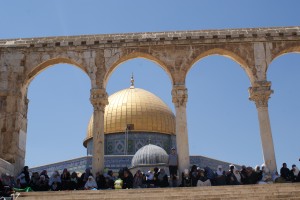Holy month, holy city, unholy Egyptian
By Khaled Diab
Even for a non-believing Egyptian, Ramadan in Jerusalem – where the three Abrahamic faiths coincide and oft collide – is a fascinating experience.
Friday 17 August 2012

Chance – or fate, if you prefer – has ordained that my unholy ‘soul' should find itself surrounded by holiness in both time and space, in the shape of the holy city, Jerusalem, and the holy month, at least for Muslims, Ramadan.
Although I gave up fasting many years ago, I still enjoy observing Ramadan, that is, its cultural and social aspects, from a comfortable secular distance. And I have encountered the multifaceted yet universal spirit of Ramadan, as a child, youth and adult, on three continents, in Muslim, non-Muslim and hybrid lands.
In its basic character, Ramadan in the Palestinian quarters of Jerusalem is similar to how it is in my home town, Cairo, or elsewhere in the Arab and Muslim world. It is a bizarre ying-yang of contradictions and contrasts: fasting during the day and feasting after dark with family and friends, like a whole month of Christmases. There is also charity and goodwill towards others, which coexists side-by-side with the uncharitable loss of temper among the fasting and furious motorists.
Although Ramadan is about austerity and frugalness during the day, at night it is a different matter. After a hard day of fasting, many feel it is their just deserts – or desserts, if you like – to consume prodigious amounts of mouth-watering seasonal delights. But even for the more spiritual and ascetic, conspicuous consumption, albeit of the immaterial variety, is still the order of the day: marathon nocturnal prayer sessions and the constant reading of the Qu'ran.
The religious aspect of Ramadan may be similar in Jerusalem and Cairo, but the secular spirit is quite different. Although Palestinians too hang out the decorative trappings of the season – including the famous fanoos or Ramadan lantern and even give the month that extra bang with sorties of unauthorised fireworks – the night-time revelry of Cairo is missing.
In the Egyptian capital, one of those city's which truly never sleeps, night truly becomes day, and throngs stay out to the wee hours in specially erected Ramadan tents and cafes, both traditional and modern, expensive and cheap, while the true night owls head off to Cairo's ancient quarters to eat a traditional dish of fuul (fava beans) just before dawn to line their stomachs for the fast ahead.
Ramadan is a much quieter affair here. This is partly because Jerusalem is small, lacking Cairo's plethora of hangouts, and Palestinians tend not to be as outgoing as Cairenes. However, Jerusalemites say that the city used to be much livelier, but the Israeli occupation has throttled the social and cultural life of East Jerusalem, which has shifted to that cosmopolitan upstart, Ramallah.
That said, Jerusalem possesses a trump card Cairo does not. Although the Egyptian capital houses some of the most impressive mosques in the world and Islam's most respected religious authority, al-Azhar, Jerusalem is home to what was once Islam's holiest site and is now its third holiest, the “Holy Sanctuary” of the sublime Dome of the Rock and the al-Aqsa mosque.

Every Friday during Ramadan, an uncountable torrent of worshippers – disproportionately old and female because of the restrictions Israel often imposes on younger Palestinian men – weaves its way through the alleyways of the old city to pray at the place where Muhammad is believed to have visited on his winged stead, Buraq, during his nocturnal trip to heaven.
Momentarily casting aside my rejection of organised religion and my scepticism of god's existence, I decided that I could not miss this unique cultural experience and, one Friday, joined the throng. Inside, the outdoor esplanade, which is so huge that it normally looks empty, was packed solid, with many of the fasting faithful stuck in the blazing heat of the direct sun.
The area immediately around the magnificent golden dome, which dominates the Jerusalem skyline, was reserved for women, while men occupied the Aqsa mosque and the area outside it. I was struck by the irony that here I was participating in a ritual that, though impressive to behold, did nothing to shake my sceptical ‘soul' out of its a-religious spiritual lethargy – in fact, living in the Holy Land has made me even more suspicious of religion – while many true believers are deprived of the opportunity to pray here for want of an Israeli permit.
While savouring the spirit of the season is enjoyable, for an agnostic, non-fasting Muslim like myself, it can become overwhelming. In the West, Ramadan can creep by with none of the fanfare Arabs tend to associate with it. A similar spirit prevails in predominantly Jewish West Jerusalem, where the holy month barely leaves a ripple on the tempo of life.
Jewish areas of the city provide the chance to eat and drink in public, which one doesn't do in the Arab quarters out of respect. That said, there are options for escape in Palestinian areas, as we discovered with some Palestinian friends on the first day of Ramadan, when we went to a swimming pool where Christians and non-fasting Muslims did rather more barbecuing than swimming.
During Ramadan, some Muslims who drink suffer a special kind of thirst… for alcohol. Some give it up voluntarily, seeing a contradiction between the “virtue' of fasting and the “sin” of drinking, though some Muslims do combine the two, like an eccentric Arab journalist I know in Jerusalem.
However, even those who wish to quench their thirst can find it hard to. In Egypt, only foreigners are allowed to consume alcohol during Ramadan. Among Palestinians, it is more complex. Although there appears to be no law forbidding alcohol during Ramadan, some Palestinian-run bars and restaurants stop serving alcohol and even shut down during the holy month. In addition, though alcohol once used to be a common feature of Ramadan in liberal Ramallah, in recent years, the city council has prohibited alcohol during the holy month by decree, a Palestinian friend informs me.
However, whether or not this decree exists is a matter of some debate, since numerous bars in Ramallah reportedly continued to serve booze during Ramadan, which suggests that it is not well enforced. In some other Palestinian cities, like Hebron and Nablus, finding a drink, even out of Ramadan, is no easy feat.
This seems to reflect the deepening religiosity of Palestinian society. Although Palestinians strike me as being generally more secular than Egyptians, there are troubling signs that tolerance is diminishing. I've heard of some shopkeepers refusing to serve women not wearing a hijab and the Palestinian Authority reportedly started deploying, a few years ago, a small police squad in Ramallah to prevent eating in public during the fast.
By one of those sleights of fate, one Sunday this Ramadan, Jews too were fasting to mark Tisha B'Av, which commemorates the destruction of the First and Second Temples, which stood where the Holy Sanctuary (or Temple Mount to Jews) is today, though they were not destroyed by the Muslims.
What could have been an occasion to express interfaith solidarity through fasting, rapidly descended into confrontation and animosity, as Muslim worshippers feared that Jews would “violate” their sacred space, while extremist Jews made some troubling pronouncements, including one Knesset member's call for the al-Aqsa mosque to be dismantled and moved.
But this sense of distrust and animosity was not always so overwhelming. Older people, such as my 90-year-old neighbour, remember a time when people of different faiths celebrated each other's festivals in a spirit of good neighbourliness.
During the late Ottoman era, a carnival outside the old city's walls to mark the festival (Eid) at the end of Ramadan was attended by Muslims, Christians and Jews alike, where they enjoyed fairground rides, horse races, Arab sweets and, apparently, even peepshows. Likewise, Muslims and Christians dressed up in Jewish costumes to celebrate the flamboyant Purim.
Centuries before, the Temple Mount/Holy Sanctuary was an interfaith space where Muslims and Jews could worship. In fact, the early caliphs who ruled Jerusalem even appointed Jews as custodians of this holiest of places, which was seen as the spiritual centre of the world.
Some of this spirit of interfaith solidarity still lives on in Ramadan, in the form of joint iftars when Jews join Muslims during the breaking of the fast, and I've even met a Jewish Sufi who fasted Ramadan in full.
Some time towards the end of Ramadan is Laylat el-Qadr (Night of Destiny), when Muslims believe that the Gates of Heaven are wide open to the prayers of the believer. Though I am not one of those, I do hope and “pray” that one day peace will, as the city's name suggests, make Jerusalem its abode and the Holy Land will finally find a way out of its unholy mess.
—
Follow Khaled Diab on Twitter.
This is the extended version of an article which first appeared in The Huffington Post on 15 August 2012.

Absolutely, bro, you’re holy shit!
Nothing is HOLY (except ME)